Rachael Williams-Mejri's Blog, page 2
January 6, 2017
Back to Tunisia
Surprise, surprise! I’m back in Tunis after having left nearly three months ago to live in France. When I left, it was hot and humid and I was exasperated with everything. People who love the heat have no sympathy for me. However, heat on vacation isn’t like heat as a lifestyle. Some people enjoying sweating and swatting at mosquitos – I am not one of them.
With my exasperation full steam ahead, imagine my delight when I finally landed in Paris! It was cool, although surprisingly not cold for October. The days were still lovely with sunshine and clouds. I knew the cold was coming, but at least I could take a few weeks and acclimate to avoid getting sick. It was long enough for me to find out the location of the grocery store and the metro.
Alas, it was not meant to be. A quick trip to immigration revealed an unfortunate bit of information: I could not do my papers there. I would have to go back to wherever I came from and get a long-term visa done before I could return to the European Union.
Apparently, Americans have three free months in the Schengen area of Europe (doesn’t include the British Isles, Romania and Bulgaria for instance) before they have to leave. Unlike days gone by, people can no longer simply leave the country and come back. Instead, they are given 3 months in 6 in which to visit. So basically a U.S. citizen has 90 days within a 180-day period. If they wish to stay longer, a long-term visa is required.
I read numerous articles, many of which indicated that Americans often overstayed their time in Europe. As long as they left out through France, Greece or Spain, they never ran into problems. I have two issues with this logic. First, I absolutely hate this bully mentality that I can do whatever I want – including breaking someone else’s laws – because I am a U.S. citizen. Second, I would make a lousy criminal. I just have no talent for this at any level, and recognized it a long time ago. I would be the one person they would pull aside. So I wasn’t going to risk it.
Needless to say, I was a little put out. I really hate flying, and the idea of flying to the U.S. for an indefinite amount of time had no appeal to me. Because tickets with return flights are cheaper in the U.S., I would have to give myself more time than I thought I would need – and how much would that be? Plus, I am going to have to go back in May regardless in order to escape Ramadan. I reminded myself that I was a Tunisian resident and looked into getting my visa from Tunis. Moez was sure it would work, so we packed our bags, found a house to rent, and flew back.
I couldn’t help but be disappointed. I knew I would have to wear earplugs to sleep; put up with loud calls to prayer – something I managed to escape for three months; and listen to dogs throughout the night. God knows what the neighbors would be like. Nevertheless, I told myself it would not be for too long. After all, most U.S. citizens get their visa in less than two weeks.
I cringed when we drove by the gigantic mosque next to my former hammam. Even if we managed to get away from it, it was still going to be loud. He had previously sounded like an air raid siren, and I doubt that had changed. I was pleasantly surprised however when we rolled up to the house we rented. It was the bottom floor of a four-story home located in Sidi Bou Said. The floor above us is inhabited by an elderly woman, her husband and house-keeper. The floors above are for her son, his wife and their children.
The bottom flour is in fact enormous, with two bedrooms, a large living room, two bathrooms and a large kitchen. It even has a terrace outside. After living in such a tiny space in Paris with other people, I felt rather like I was living in the lap of luxury.
Unfortunately, not all is quiet on the home front. Today everyone in Tunisia has a dog. However, they don’t just have a dog. They have massive animals with deep, throaty voices that bark without constraint. This lack of respect for neighbors is hardly new for us, although we were a little surprised to find it in the old areas of Sidi Bou Said where everyone knows one another.
Luckily, there is a room that is rather central to the downstairs floor, and that is where we have found our resting place. If we close the door and I put my earplugs in, I cannot even hear the mosque, much less the dogs! So my nights are successful in terms of sleep.
Otherwise, one does hear the dogs and the imam, and normally at the same time. It seems the impious animals have not been able to get used to the call to prayer any more than me. Last night the call to prayer pierced into our home, and the dogs went wild. At least 5-10 animals began to bark furiously and hysterically as total pandemonium ensued. Both I and Moez started laughing as we listened to the panic-stricken animals.
Welcome back to Tunisia!
With my exasperation full steam ahead, imagine my delight when I finally landed in Paris! It was cool, although surprisingly not cold for October. The days were still lovely with sunshine and clouds. I knew the cold was coming, but at least I could take a few weeks and acclimate to avoid getting sick. It was long enough for me to find out the location of the grocery store and the metro.
Alas, it was not meant to be. A quick trip to immigration revealed an unfortunate bit of information: I could not do my papers there. I would have to go back to wherever I came from and get a long-term visa done before I could return to the European Union.
Apparently, Americans have three free months in the Schengen area of Europe (doesn’t include the British Isles, Romania and Bulgaria for instance) before they have to leave. Unlike days gone by, people can no longer simply leave the country and come back. Instead, they are given 3 months in 6 in which to visit. So basically a U.S. citizen has 90 days within a 180-day period. If they wish to stay longer, a long-term visa is required.
I read numerous articles, many of which indicated that Americans often overstayed their time in Europe. As long as they left out through France, Greece or Spain, they never ran into problems. I have two issues with this logic. First, I absolutely hate this bully mentality that I can do whatever I want – including breaking someone else’s laws – because I am a U.S. citizen. Second, I would make a lousy criminal. I just have no talent for this at any level, and recognized it a long time ago. I would be the one person they would pull aside. So I wasn’t going to risk it.
Needless to say, I was a little put out. I really hate flying, and the idea of flying to the U.S. for an indefinite amount of time had no appeal to me. Because tickets with return flights are cheaper in the U.S., I would have to give myself more time than I thought I would need – and how much would that be? Plus, I am going to have to go back in May regardless in order to escape Ramadan. I reminded myself that I was a Tunisian resident and looked into getting my visa from Tunis. Moez was sure it would work, so we packed our bags, found a house to rent, and flew back.
I couldn’t help but be disappointed. I knew I would have to wear earplugs to sleep; put up with loud calls to prayer – something I managed to escape for three months; and listen to dogs throughout the night. God knows what the neighbors would be like. Nevertheless, I told myself it would not be for too long. After all, most U.S. citizens get their visa in less than two weeks.
I cringed when we drove by the gigantic mosque next to my former hammam. Even if we managed to get away from it, it was still going to be loud. He had previously sounded like an air raid siren, and I doubt that had changed. I was pleasantly surprised however when we rolled up to the house we rented. It was the bottom floor of a four-story home located in Sidi Bou Said. The floor above us is inhabited by an elderly woman, her husband and house-keeper. The floors above are for her son, his wife and their children.
The bottom flour is in fact enormous, with two bedrooms, a large living room, two bathrooms and a large kitchen. It even has a terrace outside. After living in such a tiny space in Paris with other people, I felt rather like I was living in the lap of luxury.
Unfortunately, not all is quiet on the home front. Today everyone in Tunisia has a dog. However, they don’t just have a dog. They have massive animals with deep, throaty voices that bark without constraint. This lack of respect for neighbors is hardly new for us, although we were a little surprised to find it in the old areas of Sidi Bou Said where everyone knows one another.
Luckily, there is a room that is rather central to the downstairs floor, and that is where we have found our resting place. If we close the door and I put my earplugs in, I cannot even hear the mosque, much less the dogs! So my nights are successful in terms of sleep.
Otherwise, one does hear the dogs and the imam, and normally at the same time. It seems the impious animals have not been able to get used to the call to prayer any more than me. Last night the call to prayer pierced into our home, and the dogs went wild. At least 5-10 animals began to bark furiously and hysterically as total pandemonium ensued. Both I and Moez started laughing as we listened to the panic-stricken animals.
Welcome back to Tunisia!
Published on January 06, 2017 22:00
October 28, 2016
What Do You Mean No Water? - Unedited Book Excerpt
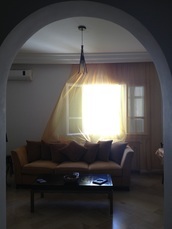 Moez and I have moved into a home that has a “Chaudière” – some French contraption that heats the water as you are using it. It sounds like a good idea, but it seems to break down a lot. Such was the case when I moved in to my new apartment.
Moez and I have moved into a home that has a “Chaudière” – some French contraption that heats the water as you are using it. It sounds like a good idea, but it seems to break down a lot. Such was the case when I moved in to my new apartment.We were told that the hot water would be fixed soon. Well, soon is a relative term – especially in Africa! In an Arabic country, they like to use the expression “in sha’allah” (God willing) so that they can shove the blame on God if it doesn’t happen. Anyway, God got blamed more than once, because the first time the Chaudière broke down, it took about five days to fix it. The second time, he came the next day. The third time, it was over a week.
So what do you do without hot water for a week? You improvise!
I must say that I am a lot more agreeable than Moez when it comes to taking adventures one step at a time. After all, we aren’t in the States, so we have to expect some kind of discomfort from time to time!
“What are we going to do!” Moez thundered.
I smirked: “No problem.”
“What do you mean no problem?”
I get up and head to the kitchen. Out came the two largest pots I had; under the water and on the gas stove.
“I can’t believe you are going to heat water!” Moez exclaims.
“I want a bath! And if it means I have to heat water, then so be it!”
The good thing about gas is that it heats and fast!
So as I hear Moez on the phone screaming obscenities at the man who needs to fix our Chaudière asking him for phone numbers, I gleefully create a system. The first pot goes in the bathtub; then it gets filled and set back on the stove; and then the second one follows. Five minute wait and repeat. In no time, guess who gets a hot bath? I become so inspiring, even Moez wants to take one.
What can I say? I’m a trendsetter!
Published on October 28, 2016 08:00
October 25, 2016
The Lord God Made Them All - Book Review
 While I am reading, I have to make it a distinct point not to read too many books on something like the Holocaust or human trafficking. Otherwise I will become depressed and start looking for a dark hole. Frequently I look for books that can break that dark side of humanity. One such book is one I downloaded to my Kindle either for free or for $1.99.
While I am reading, I have to make it a distinct point not to read too many books on something like the Holocaust or human trafficking. Otherwise I will become depressed and start looking for a dark hole. Frequently I look for books that can break that dark side of humanity. One such book is one I downloaded to my Kindle either for free or for $1.99.The Lord God Made Them All by James Herriot is an adorable read, for a lack of a better word. Although it sounds like a rather religious title, in fact, James Herriot writes about his time as a veterinarian in Great Britain. I know many people might be asking how on earth this could be amusing in any way. In fact, I ask myself the same question.
The book moves across time, however, it seems to begin just after World War II when so many broken lives are returning to the welcomed mundane. James takes back his career and continues his rounds in his native town.
It is probably his deft sense of English humor that causes daily subjects to become amusing. Among these themes, he addresses the very demanding and difficult career of being a vet. Calls in the middle of the night, absent-minded clients who wait until the work is insurmountable, and animals that are less than interested in being gelded or stabbed all make up the humor in this small town.
Herriot also writes of family and the birth of his children. Additionally, he gives the reader a most interesting glance into the job of a vet onboard a transport vessel. His first experience was between England and Russia, and his second to Turkey. I don’t suppose I ever heard of a vet on a ship, although it makes sense. Since he was a guest into Russia during the 1960s, the perspective is interesting for those of us who grew up in the 1980s and ‘90s.
I thoroughly enjoyed Herriot’s text and his insights into daily life in G.B. several years spanning after the Second World War. I look forward to reviewing future titles.
Published on October 25, 2016 08:00
October 18, 2016
The Nazi Officer's Wife - Book Review
 The Nazi Officer’s Wife: How one Jewish Woman Survived the Holocaust by Edith Hahn Beer and Susan Dworkin, is a fascinating text. I will read almost anything dealing with World War II and women’s autobiography. In fact, this particular time will even inspire me to sometimes read men’s autobiographies. Yet this particular book brought me into a new level of understanding of what it meant to be Jewish in Nazi Germany.
The Nazi Officer’s Wife: How one Jewish Woman Survived the Holocaust by Edith Hahn Beer and Susan Dworkin, is a fascinating text. I will read almost anything dealing with World War II and women’s autobiography. In fact, this particular time will even inspire me to sometimes read men’s autobiographies. Yet this particular book brought me into a new level of understanding of what it meant to be Jewish in Nazi Germany.Edith Hahn Beer grew up in Vienna, Austria during that time when anything was possible and socialist and communist ideas were the new forms of government. As she recounted her experiences, I was struck by the optimism so many Jewish people had concerning the sudden laws and prejudices against them. They unfortunately believed it would be a passing phase.
Edith was fortunate in that many in her family saw the writing on the wall and exited into several directions to escape the oncoming slaughter. Many others went into hiding in Vienna, but most were murdered in the camps – making Vienna almost completely “Jewish-free.”
The reader learns about the “U-Boat” and how many people survived by being a completely different person. Yet she also shows how this lifestyle would not have been possible without non-Jewish friends and acquaintances who knew her true background. Astonishingly enough, this includes her Nazi officer husband.
After losing parents and friends, and managing to survive the horrific psychological aspects of being both a survivor and U-boat, Edith finds herself taking on the Eastern German government.
Published on October 18, 2016 08:00
October 14, 2016
Douz International Festival - Unedited Book Excerpt
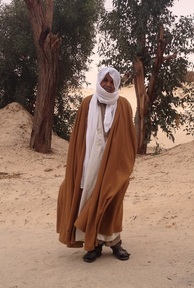 My eyes snap open at 6am. What on earth? I wonder if it has something to do with being out like a light at 9pm the previous night. Anyway, today is the big day! The festival will start early, so we have been told, and so we decide to get moving since breakfast is over early too.
My eyes snap open at 6am. What on earth? I wonder if it has something to do with being out like a light at 9pm the previous night. Anyway, today is the big day! The festival will start early, so we have been told, and so we decide to get moving since breakfast is over early too.We head down to the mess hall and find ourselves with quite a few people. We must have had tourists roll in for the evening. Moez and I find a table and go in separate directions to find something to eat.
I nearly bump into someone with an Arabian Gulf outfit. He looks me up and down and I pretend I don’t see him (which I almost don’t since I left my glasses back in the room) and hoof it back to my seat. I don’t want to deal with weird men. He will need to go to Europe to find more interesting conversation.
Moez and I discover that the festival starts in fact at 2pm, so we have some time to kill. Someone suggests we go out to a nearby town, so we take his advice and drive in that direction. The only real problem is that the Tunisian president is coming from that direction. So in fact, we were stopped multiple times, but by really nice military and cops. One guy was so nice that I gave him some oranges. He protested, but when threatened by a flying orange, he agreed. (I’m kidding.)
As it turns out, there was absolutely nothing in that direction but sand. But Moez and I found the sand to be beautiful. It was white, which turns out to be pretty much the only place where white sand is found in this area of the country. Who would have known? Tunisia is a pretty green country until you head south, so it is unusual for me even to see such lovely sand.
The landscape was flat in some places with white snow swirling in the intense wind. We wondered if it was going to be windy all day like this. Quickly the landscape changed to dunes of white fluff. Moez and I drove through a town where the entire population seemed to turn out to stand by the road. They were waiting for the president to drive by.
The current Tunisian president is from the south, which is a stark difference from the former dictators. They were all from the north and apparently had it in for the southern folk. The people in the south took to their studies and were unimpressed by the display of governmental power. The best way to control them was to leave them in poverty. The new president was not interested in maintaining the status quo, which brought him into the forefront of popularity by the southern people.
Unlike northern Tunisia, the southern part is evidently poor. Poverty is displayed by the frequent use of donkey’s and mules, and by men using bernoos and the lack of mixed cafés. People shop with coffas (baskets) and there are no large shopping centers to be found. We passed cart and donkey time after time. A lack of material goods also caused the people to miss the need to show off. So their friendliness was remarkable. An older gentleman was kind enough to wrap himself up in his bernoos and let me take a picture. He even gleefully smiled at us. A man on a donkey cart waved and as I snapped a photo of him and his wife and child.
Moez and I turned off a side road and went straight just to check out the dunes. We passed a young boy of probably 11 walking on the side of the road. After a minute we stopped and hopped out of the car to take a few pictures. While taking pictures, we trapped a few mouthfuls of sand as the wind whipped up the white stuff and thrust it through the air. When we jumped back into the car, I glanced in the rearview mirror and asked Moez where he thought the little boy was going. I couldn’t see a thing in the kilometers that stretched in front of us.
We waited until he caught up with the car and Moez called out to him. As it turns out, the boy was headed back home after working. He had to walk about ten kilometers a day one way to work and back. During school he didn’t work, but otherwise he did. He was a good student, and didn’t seem to complain. We took him back home and dropped him off in the square, where he proceeded to tell his friends that he had gotten a ride home. It really puts life into perspective.
Moez and I drove back to Douz and found a few things to snack on before the festival started. We were advised not to drive there, but we decided to listen to ourselves rather than someone else. Let me rephrase that: Moez decided to drive.
Let’s hope for the best!
Published on October 14, 2016 09:00
October 7, 2016
The Mapmaker's Children - Book Review
 I recently finished a book called The Mapmaker’s Children by Sarah McCoy. I found it to be surprisingly interesting. I am not sure why I believed it would be dull, but perhaps it is due to following the lives of two rather nondescript women.
I recently finished a book called The Mapmaker’s Children by Sarah McCoy. I found it to be surprisingly interesting. I am not sure why I believed it would be dull, but perhaps it is due to following the lives of two rather nondescript women.The first of those women is the daughter of John Brown, both a fervent abolitionist and devout religious leader. The historical figure of Sarah Brown was both historical and human. The author takes the two dimensional individual and assigns her female characteristics that bring her struggle to the forefront as she moves through life after the death of her father. Given the nature of her work in the Underground Railroad, and the affection she feels towards a man from the south, the reader can expect some suspense while reading. What she may not expect is the unusual turn at the end of the book.
Sarah Brown is offset by another character living in modern times named Eden. Living in self-pity, Eden will come to find a deep connection with the Browns and the Underground Railroad as she explores her own home. While the reader might not take to Eden at first, I believe the character will grow more and more with the observer.
The Underground Railroad is in fact an interesting subtheme of the text, allowing the reader to revisit what was learned in school. The primary theme is in fact satisfaction, and draws the two women together through the passing of time, binding them together in their humanity and femininity.
_______________________________
I love books – isn’t that a bit obvious? It is never my intention to read a certain number of books or to accomplish something in particular. If I dislike a book, I file it. Yet last year, I found out that I read more than 50 books. I was surprised, and feeling much smarter than the year before!
When I was younger, I loved fiction – particularly historical fiction. Due to poor decisions and life traps, I spent several recent years reading anything but fiction. I wanted to discover the problems I hoped to help, and I hoped to find the solutions to the bad decisions I made.
Published on October 07, 2016 08:00
October 4, 2016
Visiting the Tunisian Catacombs - Unedited Book Excerpt
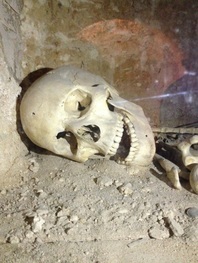 After visiting the Sousse Archeological Museum, we have decided to head to the catacombs. I have wanted to visit these ever since this summer when I realized they existed! I am sure that it can only be so exciting considering these are dead people, but I want to see them anyway.
After visiting the Sousse Archeological Museum, we have decided to head to the catacombs. I have wanted to visit these ever since this summer when I realized they existed! I am sure that it can only be so exciting considering these are dead people, but I want to see them anyway.We have been asked by a guide to take a German woman with us since she wants to visit and is still waiting for a taxi to come after having called some time ago. Her English is not very good, and my German is terrible, so we managed to do a lot of laughing rather than talking. In true American style, I talk louder.
This poor German woman very much fit the stereotype of a Germany long ago. She was definitely a good “German grandmother” figure with an ample (not large!) form and a grinning personality. I asked her if she were travelling alone and she indicated that today she was, but that her “school friend” was at the hotel relaxing and didn’t want to join her on her excursion. I find Germans to be an interesting bunch. They are considered the best tourists in the world because they spend money and are polite in other people’s countries. They do their best to say at least a few of the local words – the woman actually said “aslemah” when she first saw us, thinking we were Tunisians (which we are, I guess).
“My English is not good,” she cackled in the back of the car.
I pondered if I should sing her my German song: Ich bin Auslander und sprechen nicht gut Deutch to the tune of Comin’ Round the Mountain but decided against it. She must already be slightly intimidated by getting into a car with strangers and then losing her guide in traffic.
Moez and I manage to find our way to the museum (that is to say, Moez finds it, although I did spot the sign) and she gleefully hops out. Feeling delighted, she thanks us profusely for bringing her: “You are so kind! Bringing me to the museum! You don’t even know me.” She then becomes pleased to no end when she learns that we are to follow her inside.
After parking, Moez and I leave the vehicle. The guide starts speaking Tunisian to me, and I keep myself from drooling from stupidity. I think he realizes at some point that I don’t speak Arabic, so he leaves me alone and I wander into the ticket office. It is quite smoky in there; the man behind the counter not in the slightest concerned with antiquity. Again, Moez and I get into the museum for free and wander outside to descend into the depths of the earth (dramatic enough?).
Moez is being silly. He is not into high adventure (like this is) or into graves. So he pretends to be scared, grabs my hand and shakes like he is terrified. I manage to shake him off to get a few photos and then descend into the tunnels.
I’m not sure why the tunnels are so dark, unless they are trying to save lighting or perhaps are using it as an effect. Moez and I both have iPhones and flashlight apps, so we just light up to see anything that is too dark.
As it turns out, there is a tiny portion open to the public while the rest of the site is closed. Apparently, people can get (have gotten?) lost in the tunnels. The part that is open to visitors is about 1.6 kilometers and is circular. It is called Le bon Pasteur or the Good Pastor. Inside is a bit cramped and contains some 6000 graves in just that particular area.
Moez and I wander around by ourselves, while our guide is subjected to the emphatic yet kind German lady – who I will from now on call GL. Obviously in need of different conversation, the guide offers to take all of us down a closed tunnel. He takes a candle and hands one to GL. He offers us one, but we turn it town in favor of our iPhones.
As the guide swings the locked gate open, and the darkness gapes at us from the other side, he gesturs for us to please enter. Everyone kind of looks at him, and he at us, so I just plough my way through. I move through and then realize I was facing a left or right road. “Aleeyasar ou aleeyameen?” I call back (left or right).
“Hold on,” he advises. Moez calls uncomfortably for me, and I realize that he doesn’t appreciate being left in the dark with these two strange people. So I turn around and go back. The guide then leads the way followed by Moez, GL and me taking up the rear. How did I get back here?
I snap only a few pictures because I quickly become attached to GL. She either lost or had put out and pocketed her candle in favor of our bright flashlights. So I need to hold my phone out to so she can take a snap shot. Not the slightest bit concerned about her current surroundings, GL is often be left behind by her guide (who I learn has basically been carting her around everywhere and is now putting up with her and humoring her as best as he can while still maintaining his sanity).
The ceilings are very low, so even I had to crouch down to move forward. That coupled with the rising heat quickly gives Moez an excuse to exit. His back no longer permits him such luxuries of knuckle walking; he cannot abide the heat; and he really doesn’t want to be there anyway. However, his exiting doesn’t permit me to take any more pictures since I am the main source of light.
The guide leads us down several tunnels, showing us several things. We see the differences between the actual tunnels and the renovated portions, which had been given additional support. We also see an area where a garden is growing and the roots of the plants are hanging down and dripping sap (not sure if plants drip sap, or if that is just for trees?). I think I am most impressed by the fact that the guide speaks at the very least a little of four languages, and the fact that I could understand some of what he was speaking to GL.
At one point, he starts to walk away while GL is still taking pictures. I hesitate, grinning stupidly as I usually do, and keep shining my light on her as we walk away. He realizes what is going on and says: “Hold on, let me get her” and moves past me to return and drag her with us. At another time, she can’t seem to get her camera to take proper pictures, and he finally snatches it away from her and tells her to let him handle it because he knows how to take pictures. He does it in a nice but authoritative way, and I start to get really tickled with this relationship, realizing they should travel the world together and film it. Who knows how many millions they could make?
We finally make our way back to the exit, where I find Moez gleefully cleaning his car and attacking a fly. About the catacombs, I pretty much learn the following:
The catacombs were first uncovered at the beginning of the 20th century by the French Army. Just like Rome, these catacombs were hideouts for persecuted Christians who endured all sorts of atrocities under 400 years of Roman rule. The guide said that the Christian community did everything here in the catacombs, including eating, sleeping, burying, etc. However, I am not sure that is accurate. The websites I have read seem to indicate these areas were for burying people (since it was prohibited to bury Christians under Roman rule, much like present day Nepal) and participating in religious activities.
I saw the children’s graves, which were quite small. The graves in the walls have been excavated and some of them have been left with glass so the visitors can see the skeletal remains. The other graves that have been excavated are covered up with regular stone. Most individuals were buried after being dipped in calcium rich lime, wrapped in a shroud and then tucked into the side of the wall with some personal belongings. The grave was then closed and covered with a mosaic that included the family name. These personal items and mosaics have wisely been removed and are currently sitting around in a museum.
The catacombs themselves continue for 5.5km, and have a total of 15,000 graves that housed at least 25,000 people. Additionally, the Sousse catacombs aren’t the only ones in existence. They also have some in Lamta and Salakta, other coastal cities in the area. Unfortunately, excavation has come to a halt due to people building their homes on top of the archeological site, and also due to a lack of funding. The former dictator apparently put more emphasis on building giant mansions than in building his country’s history, and the current recession isn’t making continued progress possible.
Moez and I finally exit and he pays the guide. We ask him if he wants us to take GL somewhere else, but he just shruggs. “Leave her,” he says. “This is the 10th time she’s seen the archeological museum, so who knows how long she’ll want to stay here.” He rolls his eyes good-naturedly.
We laugh and move on to find lunch and enjoy the old city.
Websites consulted:
http://www.tunisia-live.net/2012/04/07/unearthing-the-catacombs-of-sousse/
http://www.lonelyplanet.com/tunisia/central-tunisia/sousse/sights/landmarks-monuments/catacombs
Published on October 04, 2016 08:00
September 27, 2016
Tunisian House Hunting
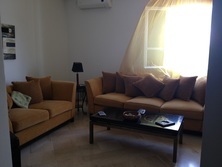 Looking for a place to live is never easy, regardless of where you are. I think nothing is truer when you don’t really know the area. It is even worse after a revolution because you do not know the changing social structures.
Looking for a place to live is never easy, regardless of where you are. I think nothing is truer when you don’t really know the area. It is even worse after a revolution because you do not know the changing social structures.We wanted to live in Ezzahra, because that is where Moez sister lived for awhile, and it was very quiet. When we visited her, not only did we never hear the neighbors upstairs or down, but also there was no ambient noise outside either. Its location in the building and windows on each side of the large apartment guaranteed a cross breeze and cool nights. At the time, the dictator still ruled and there was no mosque noise. I believe some bright lights would flash outside for the pious, while allowing the rest of the city to sleep in peace. There are some reasons to miss Ben Ali.
Unlike France, which requires mounds of paperwork and a deposit on your firstborn, it is fairly easy to find apartments and rent them. The one big problem is, as soon as the owner hears the accent, the rental prices rise.
Consequently, we struggled to find an apartment at first until we were finally thrust into a sink or swim situation. At that point, we made some fast decisions and wound up in lower Gammarth. This area proved to be an experience in and of itself, with both good and bad. At least it was easy to rent!
Published on September 27, 2016 13:00
September 20, 2016
L'Enfer, c'est les autres
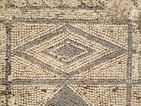 Neighbors are such a fun experience. In our changing world, they can quickly become the most obnoxious individuals on the planet, giving you the distinct desire to move into the woods and take your chances with wild animals.
Neighbors are such a fun experience. In our changing world, they can quickly become the most obnoxious individuals on the planet, giving you the distinct desire to move into the woods and take your chances with wild animals.While we had two great neighbors in Gammarth, both below and across the hall, we unfortunately had some challenging ones too. There were too many for me to recount in one blog, but one particularly obnoxious neighbor had too many children.
Three children might not sound like too many. However, when one cannot make one child behave, three is kind of like adopting a back of angry elephants. Luckily they did not live directly over us. That however did not stop me from naming the screaming child a Nazgul.
That coupled with barking dogs, strange men with purple pants, and people who sang like bleating goats, makes me happy I do not have to relive my time in Gammarth!
Published on September 20, 2016 13:00
September 16, 2016
The Magemother
 When my students talked me into reading Harry Potter a few years ago, I remembered I enjoyed fiction, but was surprised I liked fantasy. Yet, as the next few years went by, I realized it wasn’t just fantasy I liked – but good fantasy. There isn’t much of that out there methinks.
When my students talked me into reading Harry Potter a few years ago, I remembered I enjoyed fiction, but was surprised I liked fantasy. Yet, as the next few years went by, I realized it wasn’t just fantasy I liked – but good fantasy. There isn’t much of that out there methinks.I did enjoy the Magemother by Austin Bailey, which I believe was written for a very young audience. It takes place between two worlds, and surprisingly has a young girl as the main character. This young lady is pulled into the “new” world and is later given a choice on whether or not she wishes to stay.
Within the world itself, one is introduced to some typical characters for fantasy novels. There are other characters I have not heard of, and might well be from the author’s imagination. Certainly I am not an expert in all things mythological.
The plot of the story is hardly complicated, and tends to be more attached to the concept of love. Younger children will love the simplicity and perhaps slightly older children looking for a good read will enjoy the fast pace.
Be prepared, however, that the first book is just that. The author fully intends to keep writing and consequently leaves loose strings and incomplete events to be taken care of in upcoming episodes.
Published on September 16, 2016 13:00
Rachael Williams-Mejri's Blog
- Rachael Williams-Mejri's profile
- 1 follower
Rachael Williams-Mejri isn't a Goodreads Author
(yet),
but they
do have a blog,
so here are some recent posts imported from
their feed.



